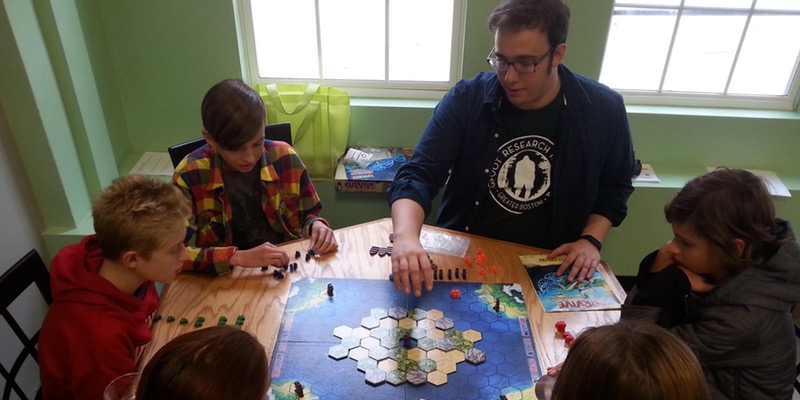SUMMER DAY CAMPS

This summer we will be hosting two camps for middle school-aged students interested in board games (June
14–16) and board game design (June 26–30).
Board Game Introduction Day Camp
From June 14th to June 16th, Spielbound will be hosting a three-day board game camp for middle school students.
Board games can be an instrumental tool to grow and encourage skills in spatial reasoning, math, critical thinking,
group work and cooperation. Throughout the days, students will have an opportunity to learn games from multiple genres
with the help of Spielbound staff and volunteers. The games selected for the camp will give students a comprehensive
understanding of the skills and fun to be gained through collaboration and play. The final day will end with a session
where parents and Spielbound volunteers will learn games from the student in the camp. Lunch will be provided each day,
send any dietary restrictions or ability limitations to greg@spielbound.org and we will work to accommodate them in
advance.
Board Game Design Day Camp
From June 26th to June 30th, Spielbound will be hosting a five-day board game design camp for middle school
students. Board games can be an instrumental tool to grow and encourage skills in spatial reasoning, math, critical
thinking, group work and cooperation. Throughout this camp, students will have an opportunity to learn games from
multiple genres with the help of Spielbound staff and volunteers, to identify the structures of board game design, and
to then design a working prototype of their own original board game. They will get to work with members of Spielbound's
Spielmason board game design group, who have printed and published multiple games. The games selected for the camp will
give students a comprehensive understanding of the skills and fun to be gained through collaboration and play, and the
design process will help them gain skills in graphic design, creative writing, and collaboration.
The camp will end on Friday the 30th with a demo session where students will teach their games to family, friends,
and Spielbound volunteers from 3pm-5pm.
Lunch will be provided each day, send any dietary restrictions, ability limitations, or questions of any kind to
greg@spielbound.org and we will work to accommodate them in advance.
 Andrew Easton –
Personalized Learning Coordinator for Westside Community Schools (photo by Bill Sitzman, permission granted to use this
photo by A. Easton)
Andrew Easton –
Personalized Learning Coordinator for Westside Community Schools (photo by Bill Sitzman, permission granted to use this
photo by A. Easton)

 Here we can see the inner workings of a star.
Here we can see the inner workings of a star.

 Smart phones are prevalent in today's social scene.
Smart phones are prevalent in today's social scene.